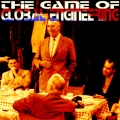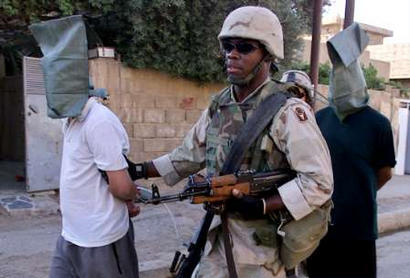|
SUPPORT
US |
|

|
|
TOPICAL INDEX |
|
The Babylon Observer places his observations and
research material under the following main
topics.
Click the pictures to find out more. |
|

|

|
|

|

|
|

|

|
|

|

|
|

|

|
|

|

|
|

|

|
|
|
|
|
|
babylonobserver.dubroom.org |
|
|
|
Families
live in fear of midnight call by US patrols |
| WWW,
2005 (Archived) - Increasing
reports of Iraqi men, women and even
children being dragged from their homes at
night by American patrols, or snatched off
the streets and taken, hooded and manacled,
to prison camps around the capital.
Children as young as 11 are claimed to
be among those locked up for 24 hours a day
in rooms with no light, or held in
overcrowded tents in temperatures
approaching 50C (122F).
 Despair:
Ghania Hassan says that her eldest son is
being held as a looter for eating a biscuit
given to him by a US soldier Despair:
Ghania Hassan says that her eldest son is
being held as a looter for eating a biscuit
given to him by a US soldier
NEVER again did families in Baghdad imagine
that they need fear the midnight knock at
the door.
But in recent weeks there have been
increasing reports of Iraqi men, women and
even children being dragged from their homes
at night by American patrols, or snatched
off the streets and taken, hooded and
manacled, to prison camps around the
capital.
Children as young as 11 are claimed to be
among those locked up for 24 hours a day in
rooms with no light, or held in overcrowded
tents in temperatures approaching 50C
(122F).
On the edge of Baghdad International
Airport, US military commanders have built a
tent city that human rights groups are
comparing to the detention camp at
Guantanamo Bay in Cuba.
Remarkably, the Americans have also set up
another detention camp in the grounds of the
notorious Abu Ghraib prison, west of
Baghdad. Many thousands of Iraqis were taken
there during the Saddam years and never seen
again.
Every day, relatives scuff their way along
the dirt track to reach the razor wire
barricades surrounding Abu Ghraib, where
they plead in vain for information about the
whereabouts of the missing.
The response from impassive American
sentries is to point to a sign, scrawled in
red felt-tip pen on a piece of cardboard
hanging on the barbed wire, which says:
“No visits are allowed, no information
will be given and you must leave.”
Some, like Ghania Hassan, sink to their
knees in despair. She holds a photograph of
her eldest son, Mohammed Yasim Mohammed, a
22-year-old student. She said that he was
walking through al-Shaab market with friends
when passing troops saw him eating biscuits
from an American military ration pack and
accused him of being a looter. Allegedly he
was pushed face down on the street while his
friends tried to explain how a soldier a
couple of streets away had given them the
biscuits.
A month later nothing has been heard of the
young man. His mother showed a fistful of
letters and petitions that she has collected
from US officials, local magistrates and a
Muslim cleric, but she and the rest of the
complainants were told at gunpoint to move
away from the prison gates.
Such behaviour merely fuels the growing
hostility between local people and the
soldiers they had welcomed barely three
months ago.
Families will naturally protest the
innocence of their relatives, but the
accounts, such as that of Aliah Khadoum, who
describes how her son went out to buy
cigarettes on June 1 and was arrested for
breaking curfew, are rarely allowed to be
tested by the local magistrates, who have
begun daily court hearings in the capital.
Elizabeth Hodgkin, of Amnesty International,
who has a bulging case file of arrests,
said: “I cannot believe the Americans are
so stupid and insensitive as to behave like
this after all the trouble they have had
over Guantanamo Bay. They must treat their
detainees humanely and let them have visits
from family and lawyers.”
Amnesty claims that 80 minors have been
detained, accused of petty offences
including writing anti-American graffiti or,
in the case of two teenage boys, climbing on
the back of a US troop carrier to hitch a
lift through a main street in Baghdad.
One of the most disturbing incidents
concerns Sufiyan Abd al-Ghani, 11, who was
with his uncle in a car that was stopped
near his home in Hay al-Jihad at just after
10pm on May 27. The boy’s father heard a
commotion and rushed outside to see him
sprawled face down on the road with a rifle
muzzle pressed against his neck and US
officers shouting that someone in the car
had shot at them.
Sufiyan was made to stay on the ground for
three hours, while more than 100 soldiers
poured into the neighbourhood, searching
houses and cars. Eventually he was taken
away with his hands trussed behind his back
and a hood draped over his head. No weapon
had been found. The boy said that soldiers
dug rifle butts into his neck and back and
that the first night he was handcuffed and
left alone in a tiny room open to the sky.
The following day he was moved to the
airport, where he said for eight days he
shared a tent with 22 adults, sleeping on
the dirt, with no water to wash or change
his clothes.
Sufiyan said that he was pulled from the
tent one morning, hooded and manacled again,
and driven to Sarhiyeh prison, to be kept in
a room with 20 other youths aged 15 or 16
— regarded as minors by the Geneva
Convention.
A woman inmate took his name and details and
when she was released she alerted
Sufiyan’s family. On June 21, the family
obtained an injunction from a judge ordering
the boy’s release, but they were told at
the prison that the signature of an Iraqi
judge no longer had legal authority. Even
when an American military lawyer demanded
his freedom, US troops refused to release
him until the lawyer appeared at the prison.
Privately US military lawyers say that they
are appalled at how some of the arrests are
being carried out.
At the gates of Abu Ghraib, frustration and
anger force men such as Adnan Akhjan, 38, a
former civil servant, to shout abuse at the
US guards.
Mr Akhjan, whose 58-year-old father was
arrested three weeks ago for driving a truck
with no doors or headlights, said: “People
are so sickened by what is happening they
talk of wanting Saddam to come back. How bad
can the Americans be that in three months we
want that monster back?”
US officials say that they are struggling to
cope with the continuing looting, as well as
attacks on troops. They say that until the
fledgeling Iraqi police force is fully
operational and jails are repaired, they
represent the only law and order.
Each morning at the Red Cross headquarters
in Baghdad there is a silent line of Iraqis
queueing to find out where a relative might
be. The American authorities have said that
they will not inform the Red Cross about
detainees until 21 days after they have been
arrested. The International Committe of the
Red Cross has been allowed to see some of
the prisoners, but says that it cannot even
begin to guess at the numbers detained.
An Iraqi exile who had been in Baghdad for
only three days after living in Denmark for
the past 27 years found himself caught up in
an American swoop after a shooting in a
street market. Not realising that the man
could read English, his interrogator made no
attempt to cover up his case file, which
described him as “suspected assassin”.
The man, who was held for more than 30 days,
is afraid to give his name and says that he
is now considering leaving Baghdad for good.
Shoot to kill, plead academics
Looters in Iraq should be shot and killed,
according to experts working in partnership
with the British Museum (Jack Malvern
writes). Academics from the Iraq Museum in
Baghdad, which has lost 13,000 objects to
thieves, said that force was needed to
protect Iraq’s heritage. Professor Donny
George Youkhana, director of research at the
museum, said: “We need armed helicopter
patrols. They will need to shoot to be
effective.”
Professor Elizabeth Stone, from Stony Brook
University, in New York, said that all of
Iraq’s 10,000 archaeological sites had
been looted. “I would like to see
helicopters flying over there shooting
bullets so that people know there is a real
price to looting this stuff. You’ve got to
kill some people to stop this. It is a major
problem.”

|
| THIS
ARTICLE FILES UNDER:
|



|
|
|
|
|
IN CASE THIS
ARTICLE WAS QUOTED FROM ANOTHER SOURCE, PLEASE
READ THE DISCLAIMER BELOW
|
§ 107. Limitations on exclusive rights:
Fair use
Notwithstanding the provisions of sections 106 and 106A, the fair use of a copyrighted work, including such use by reproduction in copies or phonorecords or by any other means specified by that section, for purposes such as criticism, comment, news reporting, teaching (including multiple copies for classroom use), scholarship, or research, is not an infringement of copyright. In determining whether the use made of a work in any particular case is a fair use the factors to be considered shall include—
(1) the purpose and character of the use, including whether such use is of a commercial nature or is for nonprofit educational purposes;
(2) the nature of the copyrighted work;
(3) the amount and substantiality of the portion used in relation to the copyrighted work as a whole; and
(4) the effect of the use upon the potential market for or value of the copyrighted work.
The fact that a work is unpublished shall not itself bar a finding of fair use if such finding is made upon consideration of all the above factors.
ORIGINAL
LAW TEXT
|
|
|
|
|
|

































 Despair:
Ghania Hassan says that her eldest son is
being held as a looter for eating a biscuit
given to him by a US soldier
Despair:
Ghania Hassan says that her eldest son is
being held as a looter for eating a biscuit
given to him by a US soldier